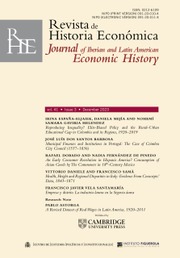Article contents
La Historia Economica de la empresa como disciplina independiente: una perspectiva histórica
Published online by Cambridge University Press: 28 April 2010
Extract
La naturaleza metodológica de la Historia Económica como economía aplicada raramente se manifiesta tan evidente como en el campo de la Historia Económica de la empresa. Lo que para la Historia Económica general es un signo de identidad adquirido a lo largo de muchos años, para la Historia Económica de la empresa fue la razón misma de su aparición como disciplina independiente. Hace ya 65 años, la necesidad de ofrecer un campo de «experimentación» para las técnicas de dirección empresarial llevó a Wallace B. Donham, decano de la Escuela Graduada de Comercio de la Universidad de Harvard a establecer en 1927 la cátedra Straus de Historia Económica de la empresa con la idea de que, en sus propias palabras, una figura acádemica distinguida
se uniese al claustro de Harvard para ver si en su Escuela Graduada de Comercio fuese posible poner en marcha un programa de investigación y enseñanza en el campo de la Historia Económica general y de la empresa que estuviese tan íntimamente relacionado con los problemas reales del hombre de empresa que llegase a ser una auténtica contributión social.
- Type
- Notas
- Information
- Revista de Historia Economica - Journal of Iberian and Latin American Economic History , Volume 11 , Issue 1 , March 1993 , pp. 181 - 192
- Copyright
- Copyright © Instituto Figuerola de Historia y Ciencias Sociales, Universidad Carlos III de Madrid 1993
References
BIBLIOGRAFIA
- 1
- Cited by


